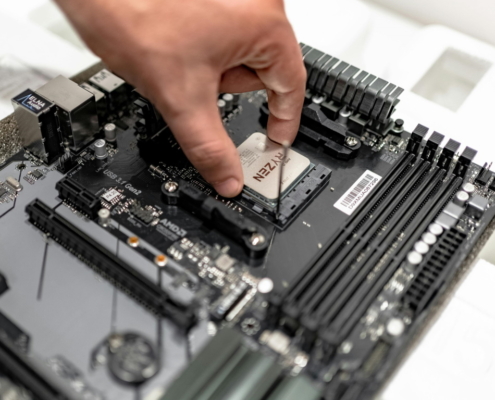
The macro-threats of microarchitectures
Digital, In the NewsProcessor vulnerabilities are no longer limited to the microarchitecural flaws identified in recent years. They now extend to different contexts and directly affect our digital uses. Faced with these increasingly widespread threats, research in security is mobilizing and multiplying approaches to better understand and address them. Maria Mushtaq, researcher at Télécom Paris and organizer of the MICSEC Winter School, sheds light on these developments and the challenges of a field in full transformation.

Renardo lays its cards on the table in embedded electronics
Digital, In the News, IndustryDeveloping an embedded electronic solution in a matter of weeks rather than years: that's the challenge taken up by Renardo, a young start-up incubated at IMT Atlantique. Born out of the industrial and educational experience of its two founders, the start-up offers a modular ecosystem combining hardware and software. The aim is to increase responsiveness and democratize electronic innovation, while meeting industry requirements.

Myothesis digitizes craftsmanship
DigitalFaced with a shortage of skilled craftspeople, passing on expertise is becoming crucial. To address this issue, the young start-up Myothesis has developed a smart bracelet that can record professional movements and reproduce them in 3D. This solution helps to provide better and faster training in sectors where training still relies heavily on direct observation.

From 5G to 6G: the unstoppable progress of generations
Digital, In the NewsThrough a series of articles, this I'MTech collection offers various insights to better understand the technical challenges, as well as the issues of optimization and energy efficiency, that accompany the transition from 5G to 6G. Between the explosion of the IoT, the emergence of the metaverse, and the imperative of energy efficiency, we take a look at the future of telecommunications.

5G & 6G: the antennas that shape networks
Digital, In the NewsIn a context of constantly growing needs for data transmission, 5G and 6G networks must comply with increasingly strict technical obligations in terms of flexibility, miniaturization, and energy optimization. Solutions explored by researchers include optimal management of radiation patterns and the development of concrete applications for millimeter wave frequencies. Two projects, YACARI and PIIEC ME/CT, are tackling the technical obstacles to these approaches by combining different antenna technologies.

5G connecting constellations
Digital, In the NewsA space-based solution to connect remote regions is soon to become reality. But using low-orbiting satellites as telecommunications relay stations means certain functionalities of current terrestrial solutions have to be reinvented. Their constant movement is the reason. For the BPI 5G NTN mmWave project, Télécom Paris scientists are tackling this technical challenge, by developing new algorithms and performance models in order to assess the limitations of the system and then optimize it.

Slicing: a MUST for multisectoral communication
Digital, In the NewsIn emergency situations such as a major car crash, proper coordination between the emergency, medical and transport services is vital. Yet these different operators often use compartmentalized communication services which hinder their performance. The NF-MUST project aims to create a dynamic, shared and flexible network architecture to enable seamless communication. It relies on slicing techniques and virtualized networks to meet the demands of different sectors.

No more, no less: energy-efficient networks for 5G
Digital, Energy & environment, In the NewsFaced with the expansion of 5G and the challenges of 6G, energy restraint and exposure to electromagnetic fields are becoming major issues for the networks of tomorrow. Between optimizing infrastructures, mobile sensors and prediction models, scientists are striving to reconcile performance, lower consumption and quality of service. Just Enough Network, a project co-led by Télécom Paris, is therefore trying to build networks that are ‘just enough’ to meet our needs, without surplus or wastage.

PERSEUS makes a breakthrough for cell-free networks
Digital, In the NewsDespite all the promises of 5G, current networks are struggling to ensure seamless connectivity in dense or complex environments. To tackle this problem, the PERSEUS project is developing solutions for cell-free networks in which distributed antenna work together to provide a more fluid service. Based on technologies such as distributed MIMO and new-generation waveforms, the IMT Atlantique research teams involved in the project are trying to solve the technical challenges posed by this new approach.

Boosting tomorrow’s IoT networks
Digital, In the NewsThe goal of the FITNESS project is to develop networks capable of adapting to the needs of massive IoT, industrial IoT and connected transport solutions. The project is supported by the expertise of several IMT schools to address the challenges that arise from the densification of connected objects, more robust applications, energy management and various protocols, and to optimize the performance of networks in real time.

